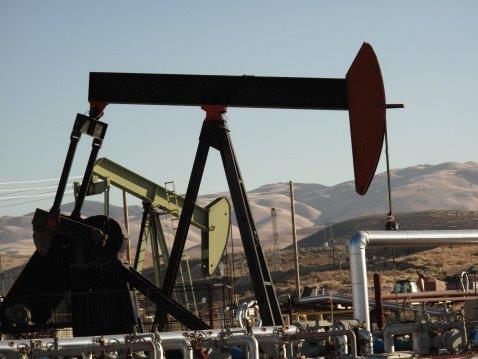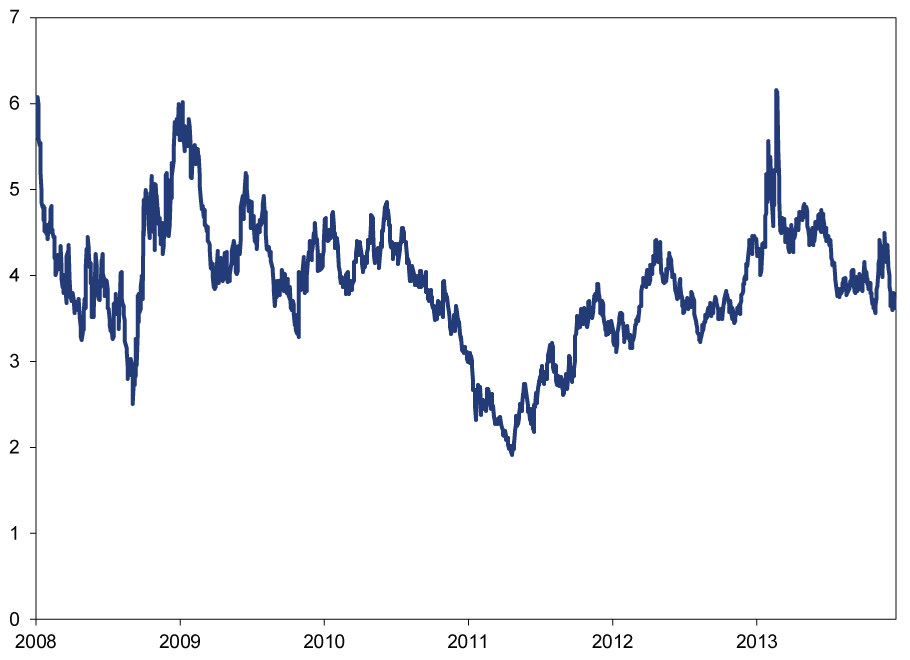Personal Wealth Management / Market Analysis
Dissecting Three Media Themes on Oil
Here is your user guide for oil-related hyperbolic news stories.
Oil's all the rage in the media, but it doesn't take much to drill holes in their theories. Photo by Seth Joel/Getty Images.
Since peaking in June, US and global oil price benchmarks have nearly halved. West Texas Intermediate crude is down 47%. Brent 48%.
Interested in market analysis for your portfolio? Our latest report looks at key stock market drivers including market, political, and economic factors.
At the risk of stating the obvious, that is a substantial decline-catching many eyeballs in the process and spurring a wide range of theories regarding what the drop means for the US economy. Most are overstated, speculation or simply incorrect. Here are the top three misperceptions underlying much of the media chatter on the subject[i]. Being aware of these themes can help you sift through the noise.[ii]
- Falling oil prices will cause the US economy to boom, as consumer spending will shoot through the roof.
We don't think so. Why? Here is one statistical quirk (reality? factoid?) to illustrate it: Retail sales include gasoline station sales, which are pretty heavily influenced by gas sales. If oil prices fall sharply, so do gasoline station sales, in all likelihood. If you take the statistics literally, November's 0.7% monthly rise in US retail sales was weighed down by an -0.8% drop in gasoline station sales. Through November, US headline retail sales are up 4.0% compared with the same period in 2013, but gas station sales are down -1.6%. You could argue that falling gas prices have hurt retail sales.
Now, perhaps you're saying, "That's too literal!" And you're right, it is really literal. Some of the gasoline station sales likely rotated to other, more fun areas. Snowboards. Craft brews. Craft stores. Dinners out on the town. Other things ... to the extent there are other things. And that's fun! But it isn't a broad, macroeconomic stimulus. It's a winners (funner stuff) and losers (gas) argument. One the data cannot definitively prove, either. Just because sales excluding gasoline rose 0.9% in November doesn't mean they would've risen less if gas prices were higher. Connecting the two is an opinion, a possibly correct opinion. But beware setting up a false binary choice. There is no guarantee consumers actually spend the extra cash those lower gas prices freed up. They might save or pay down debt. This, of course, isn't to say any of those outcomes are bad. They just aren't super-stimulative. Sorry.
- Falling oil prices will crush the shale boom, quashing a tailwind for US growth.
So this theory correctly sees prices as a signal-a key plus. It just presumes that oil firms will respond to very short-term signals by shutting off production. Which overlooks the fact that oil firms are very accustomed to oil price gyrations, even huge swings. It also overlooks the fact it can take a very long time to identify oil fields, acquire permits, drill, strike oil and monetize the oil in the ground. There are a lot of sunk (literally) costs along the way. For this reason, oil firms tend to hedge prices using futures. They also need to monetize the oil, to an extent. So the prices you see reflected in the market today may be causing firms to more cautiously approach expanding production in high-cost areas, like the Arctic. But it is unlikely to have a major impact on production in the here and now-prices would need to remain low for a long time to cause production to actually fall.
But what if they do remain low? Flip back to number one-it's a winners and losers argument. If oil prices remain low, that likely benefits some other sectors of the economy. It probably doesn't even derail the energy boom. It actually also benefits some areas within Energy! Like refiners, for whom higher oil prices are an increased cost. This is also why some diversified oil majors often balance refining and production, creating more reliable longer-term revenues. Finally, not all Energy firms are oil-reliant. Some have significant and even pure-play interests in natural gas. The massive Marcellus Shale in Pennsylvania and West Virginia is mostly a gas field, not oil. Point being, gas prices have not cratered in lockstep with oil. Gas prices went through the harangue of booming supply years ago.
US Natural Gas Prices (Dollars per Million BTU)
Source: FactSet, 12/31/2009 - 12/17/2014. As of 12/18/2014.
- OPEC not reducing production is a shot fired at US shale producers.
Well, maybe, but evidence here is sorely lacking. Pretty much all OPEC has said publicly is supply is up a lot, and they want to maintain market share. The pundits postulating this is a shot at US shale weren't exactly in the brain of Saudi Oil minister Ali al-Naimi, and neither were we. But here is the thing: If oil prices fall, and US firms are hit, they are private companies. All have differing breakeven points, depending on the fields they're operating in, techniques they use, etc. All are capitalized differently with differing access to capital markets.
OPEC nations are largely state-run firms. Which means government finances are in cahoots with Energy. When oil prices (and profits) rise, that's a plus. But not when they fall. For the US, falling oil is a winners and losers argument. For, say, Venezuela, one of the losers is the government and the other the oil industry. There isn't much else to Venezuela's economy, for those scoring at home.
OPEC may be trying to maintain its market share, but the decision is effectively Saudi Arabia's-not OPEC's in full-because they are the producer with the most flexibility to increase or decrease output. Take Venezuela. (Please!) They are in a tough spot as they can't cut production (it's their primary revenue source), but their national budget is based on higher prices.
Tensions have been long-simmering in the bloc, and this is largely why. We are fairly sure the Saudis realize that even if fringe US firms go under, their assets would likely be purchased by more efficient, bigger firms with better market access. If OPEC fired a shot at US shale, it could easily backfire by driving consolidation. However, the impact on weaker OPEC nations is already being felt.
Falling prices are part and parcel of the oil industry. They're part of a cycle, and successful oil firms know how to navigate it. We have long argued world energy supply was growing faster than demand-and that this would create winners and losers on a country, sector and company level. Admittedly, this is a bigger move in oil prices than we anticipated. But it isn't exactly something we didn't expect directionally. Big moves bring big theories, but we'd suggest many don't hold up to basic scrutiny.
Stock Market Outlook
Like what you read? Interested in market analysis for your portfolio? Why not download our in-depth analysis of current investing conditions and our forecast for the period ahead. Our latest report looks at key stock market drivers including market, political, and economic factors.
[i] Who decided these the top three? We did! Our prerogative!
[ii] And you're welcome!
If you would like to contact the editors responsible for this article, please message MarketMinder directly.
*The content contained in this article represents only the opinions and viewpoints of the Fisher Investments editorial staff.
Get a weekly roundup of our market insights
Sign up for our weekly e-mail newsletter.

You Imagine Your Future. We Help You Get There.
Are you ready to start your journey to a better financial future?

Where Might the Market Go Next?
Confidently tackle the market’s ups and downs with independent research and analysis that tells you where we think stocks are headed—and why.







